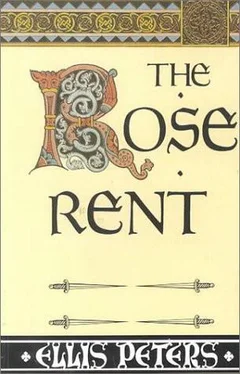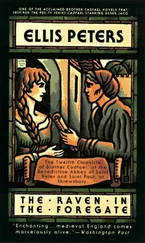Ellis Peters - The Rose Rent
Здесь есть возможность читать онлайн «Ellis Peters - The Rose Rent» весь текст электронной книги совершенно бесплатно (целиком полную версию без сокращений). В некоторых случаях можно слушать аудио, скачать через торрент в формате fb2 и присутствует краткое содержание. Жанр: Исторический детектив, на английском языке. Описание произведения, (предисловие) а так же отзывы посетителей доступны на портале библиотеки ЛибКат.
- Название:The Rose Rent
- Автор:
- Жанр:
- Год:неизвестен
- ISBN:нет данных
- Рейтинг книги:5 / 5. Голосов: 1
-
Избранное:Добавить в избранное
- Отзывы:
-
Ваша оценка:
- 100
- 1
- 2
- 3
- 4
- 5
The Rose Rent: краткое содержание, описание и аннотация
Предлагаем к чтению аннотацию, описание, краткое содержание или предисловие (зависит от того, что написал сам автор книги «The Rose Rent»). Если вы не нашли необходимую информацию о книге — напишите в комментариях, мы постараемся отыскать её.
The Rose Rent — читать онлайн бесплатно полную книгу (весь текст) целиком
Ниже представлен текст книги, разбитый по страницам. Система сохранения места последней прочитанной страницы, позволяет с удобством читать онлайн бесплатно книгу «The Rose Rent», без необходимости каждый раз заново искать на чём Вы остановились. Поставьте закладку, и сможете в любой момент перейти на страницу, на которой закончили чтение.
Интервал:
Закладка:
Ellis Peters
The Rose Rent
Chapter One
By reason of the prolonged cold, which lingered far into April, and had scarcely mellowed when the month of May began, everything came laggard and reluctant that spring of 1142. The birds kept close about the roofs, finding warmer places to roost. The bees slept late, depleted their stores, and had to be fed, but neither was there any early burst of blossom for them to make fruitful. In the gardens there was no point in planting seed that would rot or be eaten in soil too chilly to engender life.
The affairs of men, stricken with the same petrifying chill, seemed to have subsided into hibernation. Faction held its breath. King Stephen, after the first exhilaration of liberation from his prison, and the Easter journey north to draw together the frayed strings of his influence, had fallen ill in the south, so ill that the rumour of his death had spread throughout England, and his cousin and rival, the Empress Maud, had cautiously moved her headquarters to Oxford, and settled down there to wait patiently and vainly for him to make truth of rumour, which he stubbornly declined to do. He had still business to settle with the lady, and his constitution was more than a match for even this virulent fever. By the end of May he was on his way manfully back to health. By the early days of June the long sub-frost broke. The biting wind changed to a temperate breeze, the sun came out over the earth like a warm hand stroking, the seed stirred in the ground and put forth green blades, and a foam of flowers, all the more exuberant for having been so long restrained, burst forth in gold and purple and white over garden and meadow. The belated sowing began in jubilant haste. And King Stephen, like a giant breaking loose from some crippling enchantment, surged out of his convalescence into vigorous action, and bearing down on the port of Wareham, the most easterly still available to his enemies, seized both town and castle with hardly a graze to show for it.
“And is making north again now towards Cirencester,” reported Hugh Beringar, elated by the news, “to pick off the empress’s outposts one by one, if only he can keep up this storm of energy.” It was the one fatal flaw in the king’s military make-up that he could not sustain action for long if he failed to get instant results, but would abandon a siege after three days, and go off to start another elsewhere, squandering for no gain the energy devoted to both. “We may see a tidy end to it yet!”
Brother Cadfael, preoccupied with his own narrower concerns, continued to survey the vegetable patch outside the wall of his herb-garden, digging an experimental toe into soil grown darker and kinder after a mild morning shower. “By rights,” he said thoughtfully, “carrots should have been in more than a month ago, and the first radishes will be fibrous and shrunken as old leather, but we might get something with more juices in it from now on. Lucky the fruit-blossom held back until the bees began to wake up, but even so it will be a thin crop this year. Everything’s four weeks behind, but the seasons have a way of catching up, somehow. Wareham, you were saying? What of Wareham?”
“Why, that Stephen has taken it, town and castle and harbour and all. So Robert of Gloucester, who went out by that gate barely ten days earlier, has it slammed in his face now. Did I not tell you? The word came three days since. It seems there was a meeting back in April, in Devizes, between the empress and her brother, and they made it up between them that it was high time the lady’s husband should pay a little heed to her affairs, and come over in person to help her get her hands on Stephen’s crown. They sent envoys over to Normandy to meet with Geoffrey, but he sent back to say he was well disposed, no question, but the men sent out to him were unknown to him, name or reputation, and he would be uneasy in dealing with any but the Earl of Gloucester himself. If Robert will not come, says Geoffrey, no use sending me any other.”
Cadfael was momentarily distracted from his laggard crops. “And Robert let himself be persuaded?” he said, marvelling.
“Very reluctantly. He feared to leave his sister to the loyalties of some who were all but ready to desert her after the Westminster shambles, and I doubt if he has any great hopes of getting anything out of the Count of Anjou. But yes, he let himself be persuaded. And he’s sailed from Wareham, with less trouble than he’ll have sailing back into the same port, now the king holds it. A good, fast move, that was. If he can but maintain it now!”
“We said a Mass in thanksgiving for his recovery,” said Cadfael absently, and plucked out a leggy sow-thistle from among his mint. “How is it that weeds grow three times faster than the plants we nurse so tenderly? Three days ago that was not even there. If the kale shot up like that I should be pricking the plants out by tomorrow.”
“No doubt your prayers will stiffen Stephen’s resolution,” Hugh said, though with less than complete conviction. “Have they not given you a helper yet, here in the garden? It’s high time, there’s more than one’s work here in this season.”
“So I urged at chapter this morning. What they’ll offer me there’s no knowing. Prior Robert has one or two among the younger ones he’d be glad to shuffle off his hands and into mine. Happily the ones he least approves tend to be those with more wit and spirit than the rest, not less. I may yet be lucky in my apprentice.”
He straightened his back, and stood looking out over the newly turned beds, and the pease-fields that sloped down to the Meole Brook, mentally casting an indulgent eye back over the most recent of his helpers here in the herbarium. Big, jaunty, comely Brother John, who had blundered into the cloister by mistake, and backed out of it, not without the connivance of friends, in Wales, to exchange the role of brother for that of husband and father; Brother Mark, entering here as an undersized and maltreated sixteen-year-old, shy and quiet, and grown into a clear, serene maturity of spirit that drew him away inevitably towards the priesthood. Cadfael still missed Brother Mark, attached now to the household chapel of the Bishop of Lichfield, and already a deacon. And after Mark, Brother Oswin, cheerful, confident and ham-fisted, gone now to do his year’s service at the lazarhouse of Saint Giles at the edge of the town. What next, wondered Cadfael? Put a dozen young men into the same rusty black habits, shave their heads, fit them into a single horarium day after day and year after year, and still they will all be irremediably different, every one unique. Thank God!
“Whatever they send you,” said Hugh, keeping pace with him along the broad green path that circled the fish-ponds, “you’ll have transformed by the time he leaves you. Why should they waste a simple, sweet saint like Rhun on you? He’s made already, he came into the world made. You’ll get the rough, the obdurate, the unstable to lick into shape. Not that it ever comes out the shape that was expected,” he added, with a flashing grin and a slanted glance along his shoulder at his friend.
“Rhun has taken upon himself the custody of Saint Winifred’s altar,” said Cadfael. “He has a proprietorial interest in the little lady. He makes the candles for her himself, and borrows essences from me to scent them for her. No, Rhun will find his own duties, and no one will stand in his way. He and she between them will see to that.”
They crossed the little foot-bridge over the leat that fed the pools and the mill, and emerged into the rose-garden. The trimmed bushes had made little growth as yet, but the first buds were swelling at last, the green sheaths parting to show a sliver of red or white. “They’ll open fast now,” said Cadfael contentedly. “All they needed was warmth. I’d begun to wonder whether the Widow Perle would get her rent on time this year, but if these are making up for lost time, so will her white ones be. A sad year, if there were no roses by the twenty-second day of June!”
Читать дальшеИнтервал:
Закладка:
Похожие книги на «The Rose Rent»
Представляем Вашему вниманию похожие книги на «The Rose Rent» списком для выбора. Мы отобрали схожую по названию и смыслу литературу в надежде предоставить читателям больше вариантов отыскать новые, интересные, ещё непрочитанные произведения.
Обсуждение, отзывы о книге «The Rose Rent» и просто собственные мнения читателей. Оставьте ваши комментарии, напишите, что Вы думаете о произведении, его смысле или главных героях. Укажите что конкретно понравилось, а что нет, и почему Вы так считаете.












